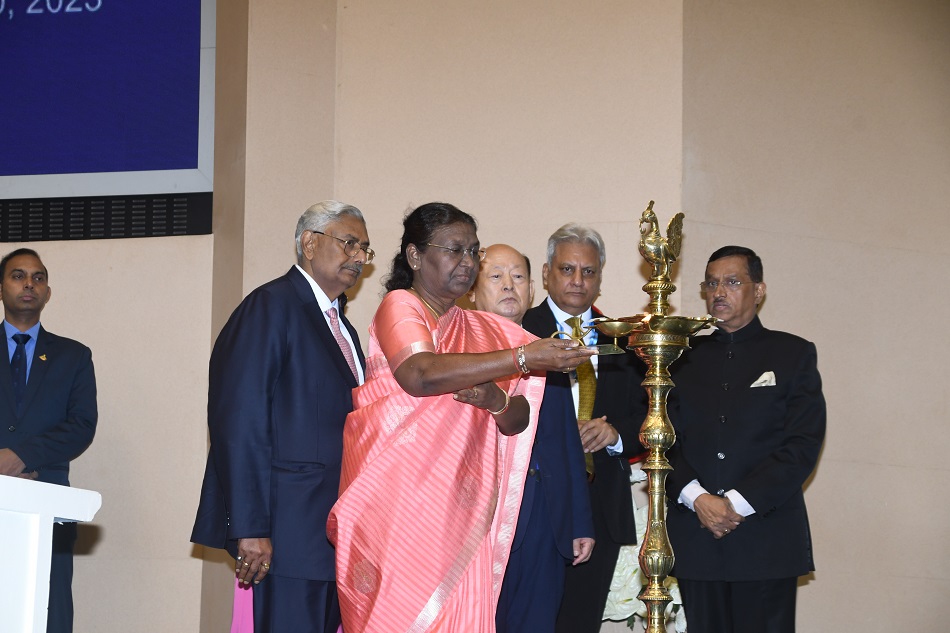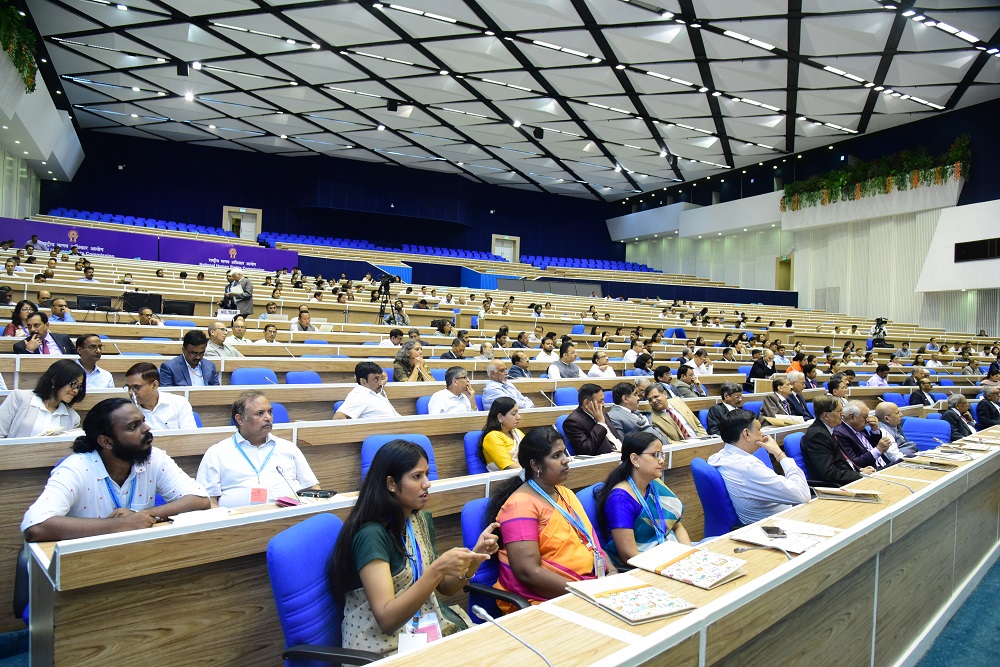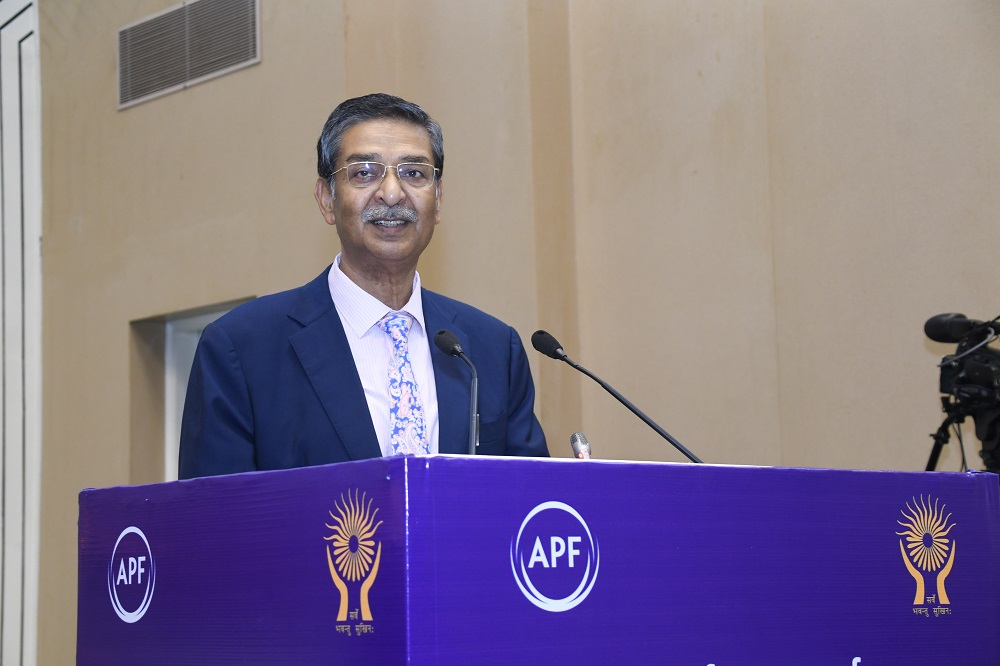NHRC organizes an International Seminar on Business & Human Rights
Press Release
National Human Rights Commission
23rd September, 2023
NHRC organizes an International Seminar on Business & Human Rights
Harmonizing human rights, climate change and Business - Key to sustainable development
National Human Rights Commission of India hosted two-days Conference of National Human Rights Institutions of Asia Pacific on 20 – 21 September, at Vigyan Bhavan, New Delhi which was inaugurated by Hon’ble President of India Smt. Droupadi Murmu. In the opening ceremony, Justice Arun Mishra, Hon’ble Chairperson delivered the keynote address.

In parallel to the Conference, National Human Rights Commission (NHRC), India also organised an international seminar on ‘Business and Human Rights’. The seminar on Business and Human Rightsfocused on two crucial themes: i.) 'Harmonizing Climate Change, Human Rights and Business' and ii.) 'Advancing Human Rights in Business and Industry'.NHRC Chairperson, Justice Mishra has accorded a very high priority to address issues related to human rights of workers in business and industry. Climate change has huge impact on human rights and sustainability of business. NHRC is working to bring all stakeholders together and work collectively.
The seminar on Business and Human Rights, highlighted the impact of climate change on human rights and subsequent evolving landscape of corporate responsibility and the need for comprehensive approaches to address these issues. The Seminar stressed upon importance of business development as well as protection of human rights in business operations citing importance of intergenerational equity and sustainable development. It was deliberated upon that while climate change poses complex challenges to realizing human rights worldwide, NHRIs have to play a pivotal role in safeguarding human rights in business operations. By addressing these themes, the seminar aimed to foster dialogue, collaboration and the development of practical solutions that promote both business success and the protection and promotion of human rights in an era of uncertainty.


NHRC Secretary General, Mr Bharat Lal, setting the tone of the deliberations said that the business and related activities directly affect people, which has a direct bearing on human rights. He said that time has come to harmonize the issue of business & human rights and their intrinsic relation with the climate change. Apart from suggesting that the world should now have women-led developments, he also said that up-skilling, education, health and welfare of work force should all be given utmost priority. Throwing light on the effect of climate change affecting the full enjoyment of human rights, he said that the business should focus on promotion and protection of human rights. He said that thinking about human rights, climate issues and business together, is the win-win strategy.
Earlier, in the welcome address, NHRC Joint Secretary, Mr. D.K. Nimhighlighted areas such as child labour, forced labour, unsafe working conditions, working hour violations, human rights violations due to environment impact, issues in supply chain, human trafficking, supplier exploitation, discrimination and inequality issues, community & land rights, corruption and bribery, where human rights violations may occur in the context of business activities. He said that vigilance, transparency, accountability and human rights due diligence becomes necessary to prevent and mitigate human rights violations within the business and industries following the UN framework of Respect, Protect and Remedy under UN Guiding Principles.
Setting the tone for the first session, the chair, Professor K VijayaRaghavan, former Principal Scientific Advisor to the Government of India, said that in an era marked by globalization and the expansion of economic activities, the issue of business and human rights has emerged as a key area to work. The panel discussed issues such as fast-paced energy consumption, deforestation and industrial processes contribution to the emission of greenhouse gases. Businesses have a moral and legal responsibility to respect human rights, as outlined in the United Nations Guiding Principles on Business and Human Rights. These principles call for companies to avoid causing or contributing to adverse human rights impacts and to address such impactswhen they occur.
Ms Gauri Kumar former Secretary (Coord & Public Grievances and Labour & Employment),in her remarks stressed that we are ‘one earth, one family and we share one future’, that is why increased collaboration and cooperative efforts involving collective working towards shared goals are the necessity of the day.
She further said that farsighted and enlightened businesses should focus on promotion and protection of human rights and should seek convergence with government in mutual long-term self-interest and cross domain inter-operability must be adopted which enables synergy. So, there should be greater engagement by businesses to redress such challenges in collaboration with government. Also, the businesses should focus on safeguarding rights while pursuing economic interests. As a lead speaker in first session, she suggested that special focus on human rights of labour and due diligence to be followed.
Other Panelists in the first session included Mr. Neeraj Sah, Joint Secretary (Climate Change), Ministry of Environment, Forest and climate change, Mr. Namit Agrawal from World Benchmarking Alliance, Mr. Shikhar Jain, Executive Director, CII and Ms. Tulika Bansal from Danish Institute of Human Rights.
In the second session, the chair, Shri Rajiv Kumar, former Vice Chairperson, NITI Aayog speaking on the theme of the session stressed that the in a diverse society like ours, coherence can lead the way to overcome the challenges. He said that focus should be on safe and livable environment for everyone. The panel discussed issues on why is it important to talk about business and human rights in these challenging times. The panel also discussed how businesses can advocate for policies and practices that promote human rights at a broader level, such as supporting fair trade, advocating for anti-corruption measures, and participating in community development initiatives. Companies can, hence, be catalysts for positive change in the wider world.
Ms. Arti Ahuja, Secretary Labour & Employment, Govt of India as the lead speaker in the second session said that 3Ds- Digitization, Decarbonization and Demographics, needs attention.She further mentioned that Labour rights are protected with special focus on decent work in the global value chains, making it integral part of trade. Fair labour practices, no child labour, no forced labour, having social dialogue with partner, issues of mental health, occupational safety and health standards to be met, insurance, mapping diseases wherein industries are present and regulation of ethics.
Making a brief interjection in the second theme, NHRC Member, Mr. Rajiv Jain said that the NHRC is committed towards the issue of Human Rights in Business. He said that focus should be on occupational health and diseases, and safe working conditions for workers. He said that there should be synergy between governments and business to ensure the human rights protection.
Other panelists in the second session included Ms. Vidya Tikkoo, Senior Vice President, Aditya Birla Group, Mr. Gaurav Vats, Director, FICCI and Ms. Nusrat Khan, representative from UNDP, India. After a day-long deliberation in both the sessions, following were the main suggestions emanated from the seminar:
i.) Regulation and Legal Frameworks: Governments should enact and enforce laws and regulations that hold businesses accountable for human rights violations, providing a legal framework for responsible business conduct;
ii.) Respect for Human Rights in Corporate Culture: It’s essential for companies to integrate respect for human rights into their corporate culture, values, and decision-making processes;
iii.) Supply Chain Responsibility: Businesses must ensure that their supply chains adhere to human rights standards, and they should collaborate with suppliers to improve conditions and practices;
iv.) Adopt Sustainable Business Practices: Businesses should integrate sustainability into their core strategies and operations, focusing on reducing their carbon footprint, conserving resources, and minimizing negative human rights impacts;
v.) Transparency and Reporting: Enhanced transparency and reporting mechanisms are crucial. Companies should disclose information about their human rights policies, actions, and impacts, allowing stakeholders to assess their performance;
vi.) Collaborative Initiatives: Support and participate in multi-stakeholder initiatives, such as the United Nations Guiding Principles on Business and Human Rights, to promote responsible business conduct.
vii.) Implement Human Rights Due Diligence: Businesses should conduct thorough human rights due diligence to identify, prevent, and address potential adverse human rights impacts in their operations and supply chains;
viii.) Collaboration with society: It is importantthat civil societywork as a partner and contribute in protection of Human rights in business.
The seminar witnessed more than 450 participants, which included representatives from various ministries/ departments of the governments and their parastatal organizations, statutory organizations, State Human Rights Commissions, Business organizations, PSUs, NGOs, CSOs, human right defenders, climate scientists and embassy and UN agencies.It was live-streamed and a large number of participants participated online in the seminar. Participants complimented the NHRC to bring all three aspects viz. human rights, business and climate change together, which is the need of hour.
***







 राष्ट्रीय मानव अधिकार आयोग, भारत
राष्ट्रीय मानव अधिकार आयोग, भारत

